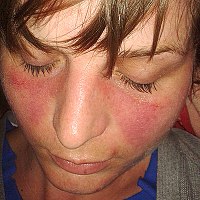
Photo from wikipedia
We aim to explore the correlation of TNFSF15 genetic polymorphisms with susceptibility to systemic lupus erythematosus (SLE). This study enrolled SLE patients and healthy individuals to detect three single nucleotide… Click to show full abstract
We aim to explore the correlation of TNFSF15 genetic polymorphisms with susceptibility to systemic lupus erythematosus (SLE). This study enrolled SLE patients and healthy individuals to detect three single nucleotide polymorphisms (SNPs) of TNFSF15 (rs3810936, rs6478108 and rs4979462) through using polymerase chain reaction-restriction fragment length polymorphism (PCR-RFLP) to analyze the possible association of these three SNPs with the risk of SLE and the mRNA level of TNFSF15 was quantified by real-time PCR. The rs3810936 T allele carrier greatly decreased risk of SLE (OR = 0.620, 95% CI = 0.454-0.849, P = 0.003), while the risk of SLE for rs4979462 T allele carrier was significantly increased (OR = 1.66, 95% CI = 1.243-2.218, P < 0.001). The mRNA level of TNFSF15 was obviously higher in SLE patients, and specifically, the patients who carried the CC genotype of TNFSF15 rs3810936 had a higher TNFSF15 mRNA, but the rs4979462 CC genotype carriers appeared to be associated with the decreased TNFSF15 mRNA (all P < 0.05). Besides, the genotypes of rs3810936 and rs4979462 of TNFSF15 were significantly associated with butterfly rash, arthritis, serositis, renal nephritis, hematological disorder, immunological disorder and positive antinuclear antibody (ANA) of SLE patients (all P < 0.05). CCT and CTT haplotypes were risk factors of SLE, but CCC and TTT were protective factors of SLE (all P < 0.05). Logistic regression analysis showed that rs3810936 and rs4979462 of TNFSF15, histories of chilblain and wet living environment were independently associated with the risk of SLE (all P < 0.05).The current results suggested that TNFSF15 (rs3810936 and rs4979462) SNPs may confer susceptibility to SLE risk, which were significantly associated with the clinical phenotypes of SLE.
Journal Title: Gene
Year Published: 2018
Link to full text (if available)
Share on Social Media: Sign Up to like & get
recommendations!